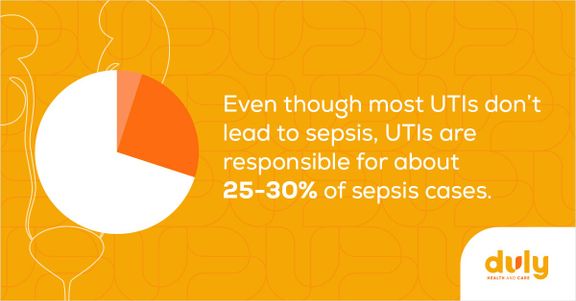It’s been happening all day: You have been running to the bathroom every few minutes with the urge to pee. Half of the time, you feel an intense burning when you go. The other half of the time, nothing comes out at all — despite the fact that you feel like your bladder is about to explode.
And now, as you feel cramps coming on in your lower abdomen, you know exactly what it is: a urinary tract infection (UTI).
The urinary tract is the system in your body that is responsible for getting rid of urine, and clearing excess fluid and waste from your body. UTIs occur when bacteria make their way into the urethra (the tube that drains urine) and infect your urinary tract.
UTIs are very common — they’re actually the second most common type of infection in the human body. And, in most cases, they aren’t serious. However, they can become serious if you don’t get treated. So if you’re usually a “let’s ride this out and see what happens” type of person, listen up: This is one of those times when it’s not worth it to wait and see.
Here are 5 reasons why it’s best to get a UTI diagnosed and treated ASAP.
1. An Untreated UTI Could Turn Into a Kidney Infection
If bacteria doesn’t clear out of your urinary tract, it could make its way up into your kidneys — the bean-shaped organs that sit on both sides of your spine under your rib cage, and are responsible for filtering out waste from your body.
While kidney infections resulting from UTIs are fairly uncommon — about 1 in 30 UTIs become a kidney infection — they are serious.
Untreated kidney infections can become life-threatening emergencies. They can also turn into chronic (long-lasting) infections, and cause permanent kidney damage. UTIs caused by kidney stones or enlarged prostate glands that go untreated are prone to kidney damage if the infection doesn’t go away.
Also read, “When Care Can’t Wait: When to Visit an Immediate Care Center Instead of the Emergency Room”
2. Or, It Could Lead to Sepsis
While also not too common, sepsis is a potentially life-threatening consequence of an untreated UTI.
Sepsis is when your body has an extreme reaction to an infection. If it’s not treated immediately, it can quickly cause tissue damage or organ failure, and can even be fatal.

3. It May Not Be a UTI After All — But It Still Needs to Be Treated
Symptoms of UTIs can overlap with other conditions, so what you think is a UTI might be something else entirely. If you delay or skip treatment, you may miss out on getting diagnosed with something that needs your attention.
For example, pain while urinating is a common symptom of UTIs, but it’s also a symptom of gonorrhea (a sexually transmitted infection). If you don’t treat gonorrhea, you can pass it on to other sexual partners, as well as risk permanent health problems like infertility.
Other symptoms of UTIs could actually be signs of chronic health conditions. For instance, if you’re always running to the bathroom, your frequent urination could be a symptom of type 2 diabetes — a condition that needs to be diagnosed early on to prevent serious complications.
If you’re concerned that you may have a UTI, visit a Duly Health and Care Immediate Care Center or make an appointment with your primary care provider as soon as you can. If you have recurrent UTIs (2 or more infections in 6 months, or 3 or more infections in one year), make an appointment with a urologist.
4. You Might Be Pregnant
Frequent urination might be a classic sign of a UTI, but it could also be an early sign of pregnancy.
While pregnancy isn’t going to stay under the radar for too long, it’s best to know as soon as you can so that you can start prenatal care and begin taking precautions, like not drinking alcohol.
5. You Don’t Deserve to Be in Pain
The right medication can seem like a lifesaver when you’re in the throes of a UTI.
If you are not pregnant and are otherwise healthy, you can most likely be treated with a short course of antibiotics. The antibiotics are quick to work — typically, symptoms ease within just 1 or 2 days of starting them. Your provider may also give you a second medication called phenazopyridine that numbs your urinary tract so you can get more immediate relief before your antibiotics kick in. (Just don’t be alarmed when you look in the toilet — it’s normal for phenazopyridine to turn your urine bright orange).
The sooner you see your provider, the sooner you can get your symptoms under control and breathe a sigh of relief.
Health Topics:








